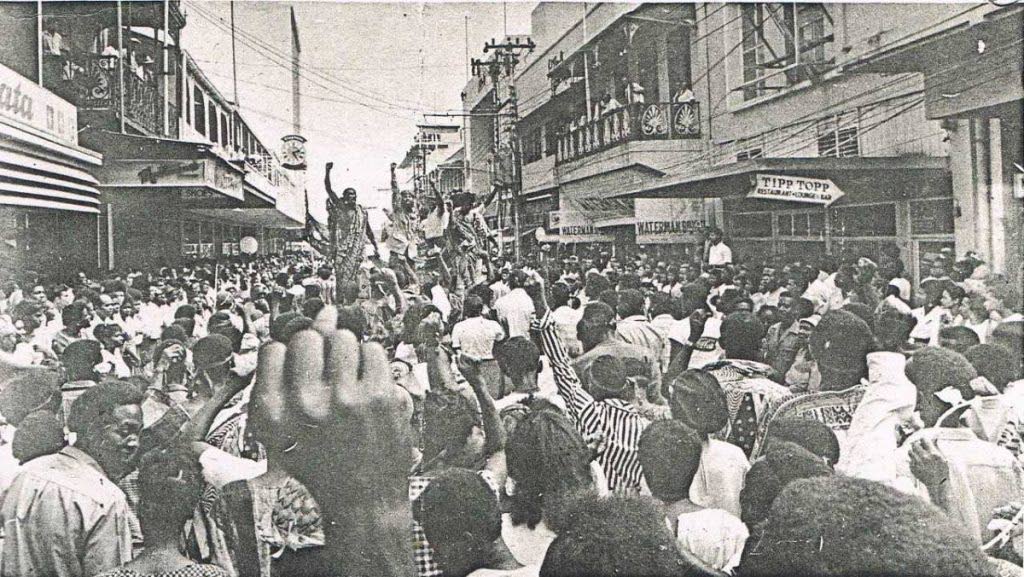Writers talk TT Black Power at Bocas Lit Fest

THE 2020 NGC Bocas Lit Fest infused messages of black empowerment and identity into its three-day line-up of conversations in segments broadcast on Facebook and YouTube, last weekend. The annual literary festival was reimagined this year due to restrictions to limit the spread of covid19.
In the segment Revolution Time, TT-born writers shared literary work reflecting on the experience of enslaved Africans and tracked how much the systems of governance and education have evolved to accommodate growth for people of African descent. Particular references were made to the Black Power Movement in TT during the 1970s.
Writers Lisa Allen-Agostini, Vahni Capildeo, Amílcar Sanatan, and Desirée Seebaran did readings from bodies of new fiction and poetry related to the period.

In her reading, Seebaran, the winner of the 2019 Queen Mary Wasafiri New Writing Prize for poetry, read, "To revolt, meaning to renounce allegiance to a language that stuffed mouths with sharp cane and raw cotton – seasonal crops for perpetual suffocation."
She compared the physical and mental forms of abuse and oppression including whipping, mutilation and rape of men and women. The plantation as a system was compared to modern systems of oppression, such as racial profiling, highlighting, however, that with the advancement in technology, greater awareness can be built around racism in all forms and racial oppression.
"This poem was difficult for me to write even though I have been occupied and obsessed with social justice (and) black consciousness for a long time – since my teens."
She said the way she generally explores these themes is through scars, which represent trauma and constant reminders of the trauma. "If not physical scars, they are mental and emotional. Black people are just walking around with a lot of scars on the inside and outside from being objectified, dehumanised and enslaved in many ways."
Capildeo, author and winner of the 2016 UK-based Forward Prize, did a reading of Revolution Time. The piece highlighted the two-fold nature of revolution – on personal and collective levels.

Sanatan, a writer, academic and activist whose work and research focuses on men and masculinity in the Caribbean and cultural geography,
did a reading of his piece Independence, which highlighted the continued use of human and natural resources in the Caribbean to build the United Kingdom through industries from sugar cane to natural gas.
He also read March to Caroni in honour of student Beverly Jones who was killed by police during the Black Power Movement, and two others which highlighted the impact of colonialism on the Spanish and French-speaking Caribbean. He referred to similarities in the experiences of enslaved Africans and indentured labourers brought to the region as the workforce for sugarcane and cocoa industries – and how these systems affected their culture and the lives of their descendants.
Among his readings was a piece that remembered the funeral of National Joint Action Committee member Basil Davis. Davis was recognised as TT's first Black Power martyr when he was shot dead by police on April 6, 1970, in Woodford Square, Port of Spain. He died moments after interrupting the police as an officer attempted to arrest a man who was deemed socially out of place.

"Nothing but silence. Nothing to bid farewell to. Nothing dressed in black but their...skin in the afternoon sun. Grief marched on expanded pavements... From Port of Spain to San Juan they paraded their historical suffering."
In the four pieces read by Sanatan,
he reflected on the injustices experienced by people of colour, the tensions built between races and social classes and the experiences of people from the Caribbean when they went to the "mainland". He explored the experience of Caribbean people, before independence, seeing themselves as British, Spanish, or French, while not truly benefiting from being considered as such.
Sanatan wrote of people visiting or migrating to the mainland and being treated like second-class outsiders, generally relegated to work for which they may be overqualified. He spoke of the "half promise of independence" and colonialism's creation of colourism and the demonisation of cultural practices brought from the continent of Africa.
The retention of African culture was juxtaposed with the glorification of Eurocentric ideals such as the standard language, and physical appearances being ranked as more beautiful based on proximity to whiteness – all the while monuments of European imperialism stand throughout cities of the region. In reflections on the experiences of le Negro in the French Caribbean he stated, "We do not live in the paradise they discover over and over again."
"This series of short poems was centred around the idea of blackness and how it is understood in the Caribbean and the Americas.

"We are in a moment now," he said, "Where the movement for the dignity of black lives throughout the world has gripped the imagination of many."
He said the current world affairs have forced people to contend with views of not just race, but how people can create material outcomes for racial justice. Sanatan said in consideration of black power in TT, it is important to think about interracial solidarity between people of varying racial and cultural backgrounds, primarily those of African and East Indian ancestry.
An author and editor, Allen-Agostini read Venecia, a poem inspired by, and including quotes from W Chris Johnson's essay Guerrilla Ganja Gun Girls: Policing Black Revolutionaries from Notting Hill to Laventille. In the poem, she explored the looming issue of the absent father in TT and across the region while exploring the residue of colonialism, ambition, carnival culture, same-sex relations, the intricacies of manoeuvring a challenging economy – and ultimately the lack in knowledge of history among youth in modern TT.
"Jodi's grandfather...asked me if I knew who Beverly Jones was. 'IDK (I don't know),' I said. He said she was an unsung hero of the revolution. 'What revolution?' I asked."
The piece highlighted social issues and compared the experiences of Jones, a student of St Joseph's Convent, Port of Spain, to those of the character, whose letters to her father were read by Allen-Agostini.
Issues also brought to the fore through the experiences of the sole voice in the poem included police brutality, rape and mental health. The quality of the education system that is said to tell students little of their history was a running theme, and the not-so-glamorous parts of TT history, especially regarding periods such as the Black Power Movement.
"Beverly was a convent girl like me. She got involved in this group – The National Union of Freedom Fighters. They called themselves Nuff. They bombed a police station #totesjelly (totally jealous). What I want to know is, how come they didn't teach us this in history. Nuff hid in the Northern Range... Beverly lived in a camp up there in between running out to rob banks and kill policemen... they said they were willing to die to achieve true liberation. The flying squad hunted them down like animals. They shot Beverly Jones in the face – they murdered her. She was 17...she died with a gun in her hand."
Allen-Agostini said she hopes more people will research this period of TT history that is not taught in schools. "It seems like some weird, dirty little secret in our history."


Comments
"Writers talk TT Black Power at Bocas Lit Fest"